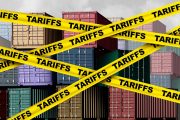
In stealth succession on Wednesday evening, both the House and Senate approved three so-called free trade agreements with South Korea, Panama, and Colombia. The Obama administration claims that the three pacts will boost exports by $13 billion and result in the creation of tens of thousands of American jobs.
Speaking on the occasion, Obama urged lawmakers to approve the trade deals as they were critical to building open, free, transparent, and fair economic platforms in the Asia-Pacific area and South America. After both Houses of the Congress approved the deals on Wednesday, the President issued a statement hailing the development as a "major win for American workers and businesses."
“Tonight’s vote, with bipartisan support, will significantly boost exports that bear the proud label ‘Made in America,’ support tens of thousands of good-paying American jobs and protect labor rights, the environment and intellectual property," he added.
Final approval of the agreements represents a victory for the Obama administration and congressional leaders in both parties, who have touted the trade pacts as a means to jump-start the flagging economy without additional government spending. Ratification of the agreements holds particular importance for the President, who has set a goal of doubling U.S. exports by 2015 and is facing a tough bid for reelection with unemployment stuck at 9.1 percent.
The bills go to Obama, who spent two years seeking to broaden Democratic support for pacts revised from initial agreements reached by former President George W. Bush. The South Korea deal (known as KORUS FTA), the biggest for the U.S. since the North American Free Trade Agreement (NAFTA) in 1994, removes duties on almost two-thirds of American farm exports, and phases out tariffs on more than 95 percent of industrial and consumer exports within five years.
The House approved KORUS FTA Wednesday by a vote of 278-151 and the Senate voted 83-15 in favor of the measure. As with earlier free trade agreements, there was broad bipartisan support for the measure, with opposition coming predominately from labor unions and some Tea Party groups. Twenty-one Republicans voted against the bill in the House, including Rep. Duncan Hunter (R-Calif.), a longtime opponent of free trade agreements.
"We don’t do much around here that’s bipartisan these days," noted Sen. Rob Portman (R-Ohio), who was U.S. Trade Representative during the George W. Bush administration. "This is an example of where we can come together as Republicans and Democrats realizing that with 14 million Americans out of work, we need to do things to move our economy forward."
The free trade agreements with Panama and Colombia also passed by similar wide margins. The Office of the United States Trade Representative says that the U.S.-Panama Trade Promotion Agreement will “guarantee access to Panama’s $20.6 billion services market, including in priority areas such as financial, telecommunications, computer, distribution, express delivery, energy, environmental, and professional services,” and notes that “Panama’s strategic location as a major shipping route also enhances the importance of the Agreement. Approximately two-thirds of the Panama Canal’s annual transits are bound to or from U.S. ports.”
Panamanian President Ricardo Martinelli said the trade agreement will help to attract foreign investment and increase commerce with the United States, contributing to the creation of new jobs in the Central American country. "We, Panamanians, have to prepare to take advantage of this agreement," Martinelli stressed.
Panama’s Chamber of Commerce, Industries and Agriculture called it "a historic moment for Panama."
"This is a historic moment for Panama. A treaty with the largest trading partner in the world has been ratified and this will open the doors to a very important market," said Chamber President Federico Humbert in a statement. "We hope this agreement will bring great opportunities for Panama, while encouraging competitiveness and attract more foreign investment to our country," Humbert said.
Like the free trade agreement with Colombia, however, it is expected to have relatively little impact on American economic growth. Nonetheless, in Cartagena, Colombian President Juan Manuel Santos declared, "Today is a historic day for relations between Colombia and the United States." He added that the agreement with his country "is going to generate much well-being for our peoples." Analysts say that the South American nation’s foreign market will now be open to many different U.S. products and other types of business. On top of that, it’s estimated that there will now be an increase of U.S. exports of $1.1 billion and a growth of imports from Colombia of about $487 million.
“By eliminating the trade barriers, Colombia will have an upward trend in terms of our trade and investment relations,” explained Ricardo Duarte, Colombia’s former vice minister of Industry. “And the U.S. will reverse the downward trend of Colombian traders preferring other markets at the expense of the U.S.”
A Closer Look at KORUS FTA
A variety of U.S. industries are expected to benefit from the agreements, especially KORUS FTA. Producers of beef, dairy, pork and poultry products, chemicals, and plastics are all likely to increase exports to Korea. The banking and financial services industries could also be big winners, analysts said, benefiting from relaxed regulations and rules relating to foreign investment. “These free-trade agreements will give our economy a much-needed shot in the arm and create tens of thousands of American jobs,” emphasized Sen. Max Baucus (D-Mont.). “The passage of these agreements today is a significant victory for American workers and businesses, and will help create jobs here at home.”
However, legitimate concerns remain over the effect of KORUS on the American middle class. Like other free trade agreements, KORUS is another example of government-managed trade, which results in nether prosperity nor economic freedom. KORUS will create an influx of in-sourcing, in which South Korean elites will exploit American legal protections unavailable to American industry in Korea. KORUS has terms that grant extreme rights for foreign investors within the U.S. that would allow them to play by very different rules. The scope of what can be challenged in the U.S. is extremely broad. This means that while South Korean companies will be able to come to America and do practically whatever they like, U.S. companies will not be able to do the same under Korea’s state-run system.
In addition, South Korea will still be able to use barriers to trade that the United States doesn’t have, such as special tax breaks and subsidies (ironically, South Korea levies a 10-percent protective value added tax on imports from the United States, while the United States gives them tax-free access to American markets). And, adding insult to injury, under KORUS FTA, South Korean firms that invest in the United States will have the option of circumventing local American trade courts to determine if their rights have been denied in favor of requesting third-party international arbitration, empowering sovereignty-compromising bodies such as the World Trade Organization and other internationalist bodies. These would especially include the World Bank’s International Centre for Settlement of Investment Disputes (ICSID), which the United States has participated in since 1966, or arbitration would be submitted to a panel that would follow UN Commission on International Trade Law (UNCITRAL) arbitration rules, to which the United States agreed to in 1968. This process is already used for most U.S. free trade agreements in addition to America’s 40 bilateral investment treaties (BITs). Regardless of the specific mechanism utilized, American sovereignty is compromised in favor of global governance and regulation.
Thus, KORUS, like the agreements with Panama and Colombia, is yet another “free” trade agreement that will take away our right to do what is in the best interest of our country. The basis of all free trade agreements is to give foreigners unrestricted access to everything we have, eliminating duties and tariffs that protect our fledgling and older industries. South Korea has only 48 million people; the U.S. has over 300 million. Under “free trade,” it would not be possible to have anything but a massive trade imbalance with this country. By selling to us below cost, they are, by design, forcing our companies to move out of the country, sell out, or go out of business — which has already been happening at an accelerated rate. KORUS will only hasten our demise, which constitutionalists can only conclude is by design, as the Insiders (manifested as the WTO, World Bank, and multinational corporations) continue their steady and intentional march toward the defeat of the American Republic and the sacrifice of American economic strength and sovereignty on the high altar of internationalist “free” trade.




